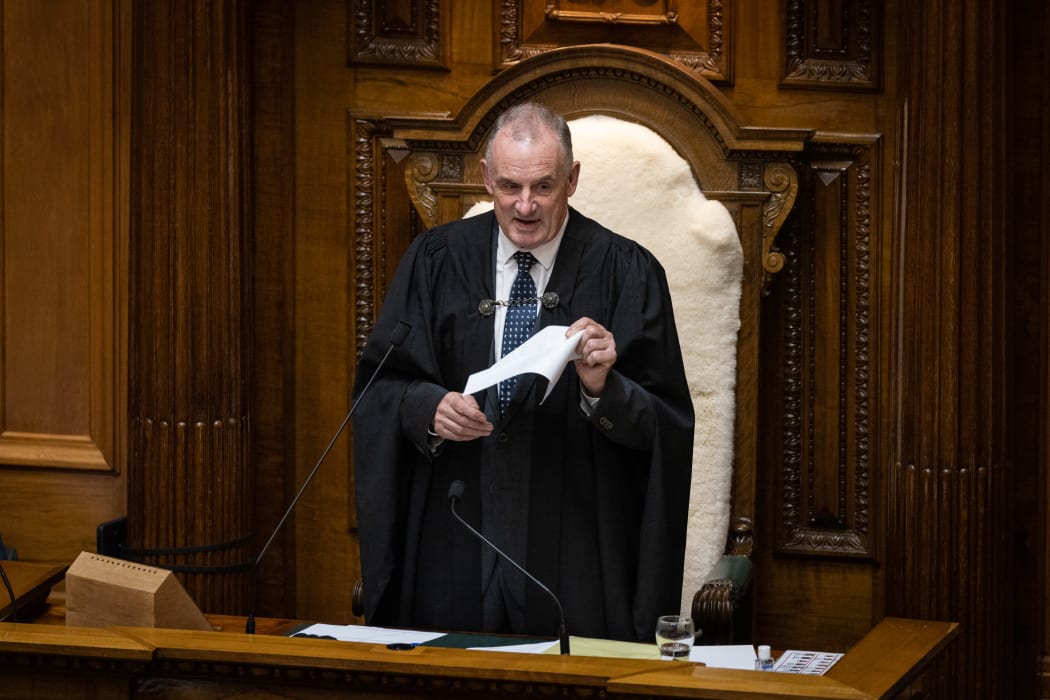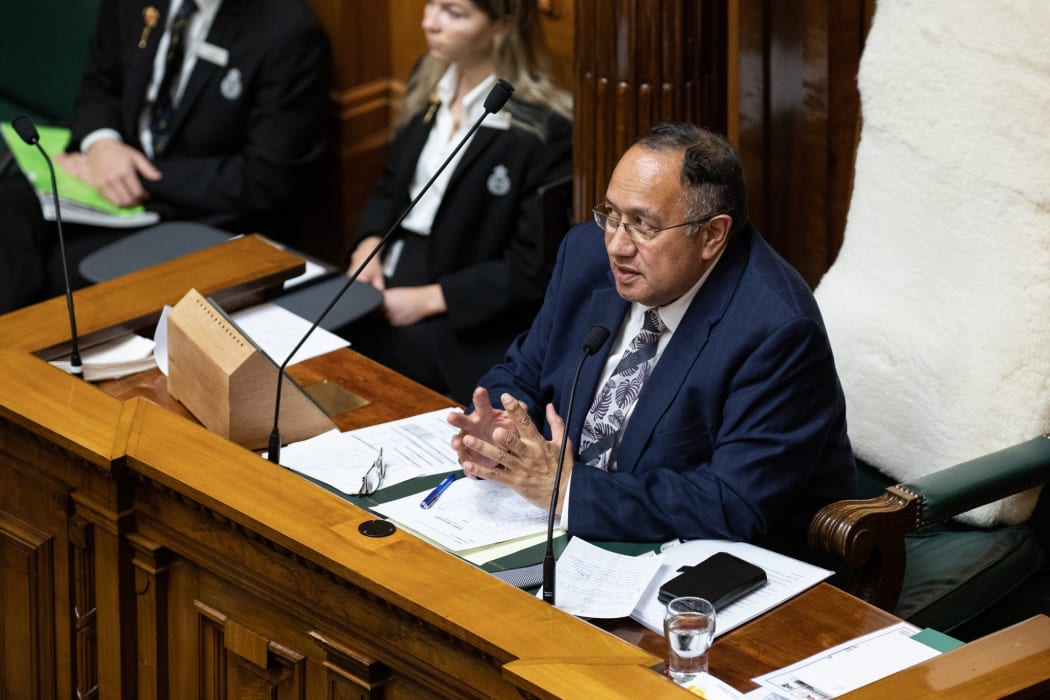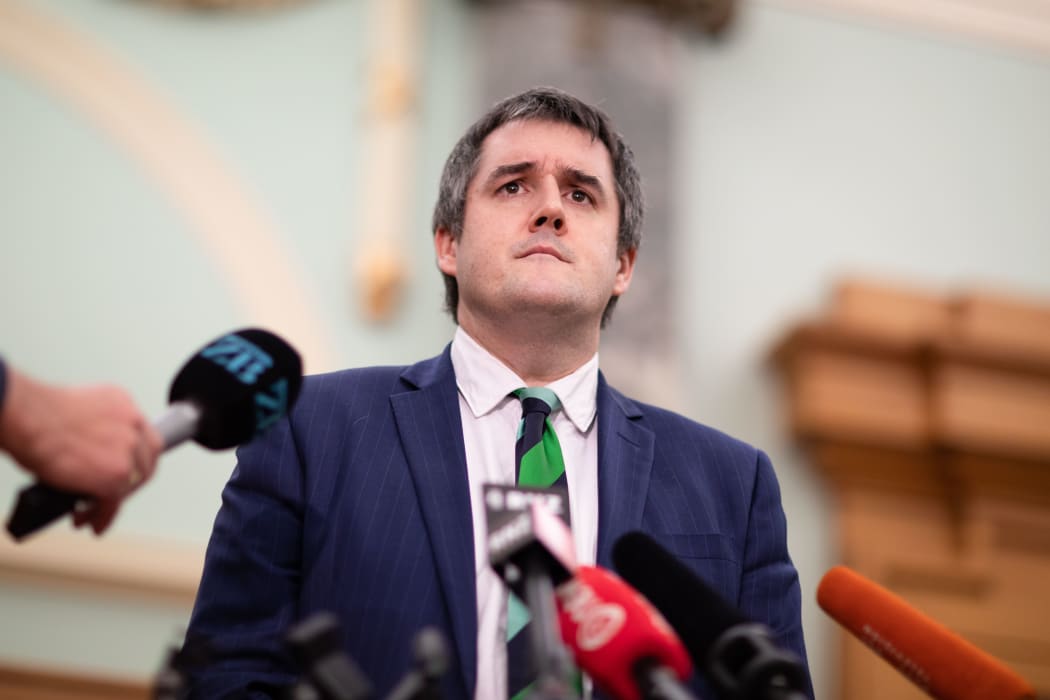A lot of what happens in Parliament is theatre of one kind or another.
There is the symbolic and slightly regal theatre of the Speaker arriving in procession after the Serjeant-at-Arms who carries the Mace that represents the Speakers’ authority. There is a ceremonial, courtly theatre of a new MP waiting at the bar to be invited into the Chamber (as happened this week for Lemaunga Lydia Sosene).
And there is the political theatre of MPs asking for things they won’t get (and surely know they won’t get), which garners the political ammunition of being denied.

Trevor Mallard addresses the House Photo: VNP / Phil Smith
Asking to be denied
Government MPs do this by inviting oppositions to support budget measures, knowing that oppositions are duty bound to oppose budgets even if they promise nothing but puppies and rainbows.
Opposition MPs ask for the unlikely more often, through Points of Order (complaints to the Speaker), and by requesting things that seem reasonable but are against Parliament’s rules.
For example on Wednesday ACT party leader David Seymour requested that Parliament hold an urgent debate which is allowed, but the topic he wanted to debate was Parliament’s Security team trespassing 151 people as a consequence of the occupation of Parliament’s grounds.
The Parliamentary Service (which includes security) falls within the Speaker’s ambit. He is also Parliament’s landlord and trespassing is done under his delegation.
So, in reality the request was to hold a debate about the actions of the Speaker and/or things done under his authority. David Seymour hadn’t named the Speaker in his request, but that’s some clever sophistry.
The Speaker Trevor Mallard is usually officiating when requests for urgent debates are considered, but he left this one to his Deputy, Adrian Rurawhe who outlined the inevitable decision.
“An urgent debate may only be held if the matter involves the ministerial or administrative responsibility of the Government—Standing Order 399(2)(b). The Speaker is not a member of the Government, and the actions of the Speaker cannot be the subject of an urgent debate.”

Deputy Speaker Adrian Rurawhe in the chair Photo: VNP / Phil Smith
That’s not a new ruling. The parameters for urgent debates and ministerial responsibility have been well laid out over decades. Regarding the Speaker’s responsibility they were most recently ruled by two National Party Speakers, David Carter and Lockwood Smith.
Here’s David Carter when he was Speaker.
“The purpose of an urgent debate is to hold the Government accountable for an action for which it is responsible (according to Speaker's ruling 207/2). The Speaker is not part of the Government and, in recognition of the special position of the Speaker as presiding officer, cannot take part in debate or answer oral questions in the House. I draw members' attention to Speaker's ruling 215/7, which states that a second call in an urgent debate always goes to a Minister so that the Minister speaking for the Government has an extra period to respond. There can be no question of the Speaker, elected by the House to speak for it, ever speaking for the Government.”
The sitting duck
All speakers tend to become a target of oppositions and sometimes (if they’re being very generous), of their own party.
One of the reasons for this is the human tendency to blame the ref when the game goes badly. And just like a referee, every call a Speaker makes annoys at least half the MPs.
There is also the fact that many Speakers are among the most identifiable MPs which of course makes for a more likely target.
But also, Speakers are just a really easy target because (again just like a referee), they are a bit hamstrung from fighting back.
Their job is speaking on behalf of Parliament and not themselves; and trying to stay ‘above the fray’ more-or-less prevents them from self-defence. Adrian Rurawhe pointed to this on Wednesday.
“If you think about every urgent debate in this House, the Minister responsible has a right to reply. The Speaker can never reply, and so that's actually out of order, and I'm not going to put that leave. And I'm not going to entertain any arguments about it.”
A release valve (of sorts)
Obviously MPs do need a mechanism to release their ref-induced angst and so Parliament’s rules (the Standing Orders) specify a specific mechanism for complaint.
It’s putting a motion on notice, putting on the order paper an indication that you want to debate a complaint about the Speaker.
But here’s the rub, only Government Notices of Motion are automatically debated. All backbencher notices languish unless given leave.
So, a government can debate the speaker’s performance, and an opposition could also do so with a majority (which by definition probably makes them the government).
That sounds mean but I suspect the reason for that rule is that if oppositions could propose notices of motion which would all be debated, that would quickly become an excellent tactic to endlessly stall legislation and grind the legislature to a halt.

Chris Bishop Photo: RNZ / Angus Dreaver
It’s worth noting that National's Shadow Leader of the House Chris Bishop has had more than one Member’s Notice of Motion aimed at the current speaker on the order paper.
The current one reads “Chris Bishop to move, That the House has no confidence in the Rt Hon Trevor Mallard as Speaker of the House of Representatives due to his childish, provocative, and embarrassing actions during the occupation of and protest at Parliament grounds in February 2022, which was counterproductive to resolving the situation and done without the support of the New Zealand Police.”
None of this is particularly new. In "The Ayes Have it": The Development of the Roles of the Speaker of the House, 1854–2015, Pita Roycroft describes the attempts of Speaker Ronald Algie to wrest control of the Chamber. Algae was a National Party Mp and Speaker from 1961-66.
“Speakers who took an increasingly rigid approach to the application of Standing Orders were, however, sorely tested. Algie's ‘tendency to revert to a schoolmasterish style’ when dealing with errant members and applying Standing Orders was not well received. One of his decisions prompted a ‘Heil Hitler’ from one member. Algie would lose patience with constant interjections and even threatened to name offenders. His pedantic approach resulted in countless notices of motion regarding his rulings.” (New Zealand Journal of Public and International Law, Dec 2015).


